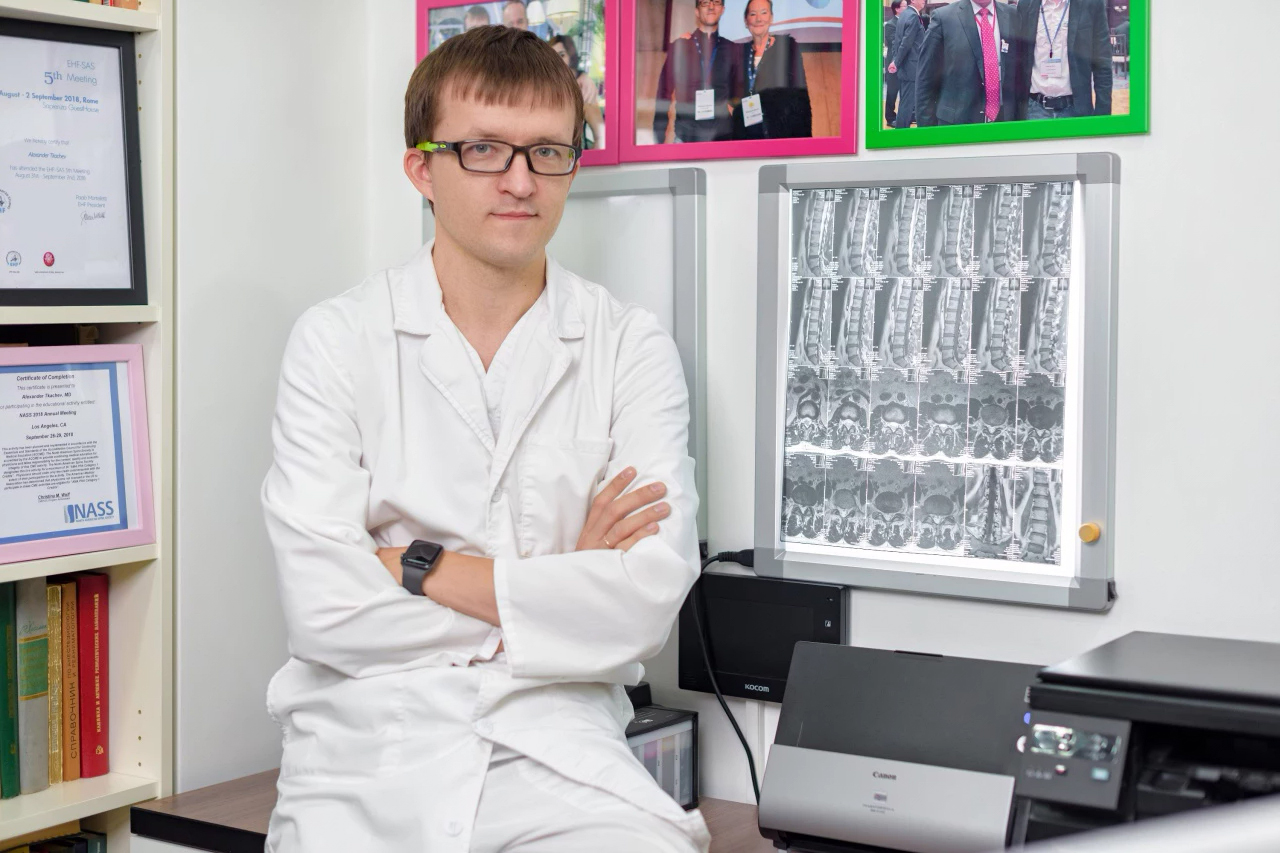A hernia is nothing more than trauma, just like a skin wound or a fracture. And it is not a miracle that our body is trying to repair it, says Alexander Tkachev. Resorption (Lat. to absorb) is a natural physiological process that we learned to speed up and modulate, but we will talk about this later.
History of Herniated Disc Resorption
Let’s first take a step back. In 1992 neurologist from Volgograd Tkachev Mikhail Mikhailovich (father of Tkachev A.M.) started his own medical practice and began to treat pain syndromes. He used available at that moment simple physical therapy equipment, among his methods was needle therapy and pharmacopuncture. The main aim of conservative therapy in those times was to reduce pain syndromes.
A small family practice began to grow in 2009 when Alexander completed his internship training in Neurology and Medical Genetics and followed his father. At the very beginning, the young doctor noticed that every patient has different dynamics of recovery and that more detailed diagnostics is required. Today MRI (Magnetic resonance imaging) is one of the best tools to diagnose a disease. However, 10 years ago this method was not widely available. Russian medicine has just started to introduce MRI and the first patients shared their MRI scans with Volgograd specialists.
- We witnessed that herniated discs can be reduced without surgery, explains Alexander Tkachev. MRI helped us to track this process. We also noticed that patients with reduced hernia felt much better. However, herniated disc resorption occurred not in all patients. We had more questions than answers and we were eager to find the answers.
Alexander started to learn bits and pieces about the issue.
-At that time there were only 2 methods of treatment – surgical and conservative. It is all clear with the surgical method when the cause of pain is simply cut off. However, no one analyzed how conservative treatment helps to treat herniated disc, to reduce pain was everything that was required. I started reading Russian and foreign medical literature, I was searching for the information about the mechanisms of herniated disc resorption, but the information was very limited. However, it was clear for me that non-surgical resorption was a revolution in medicine, and we should explore and understand it from a scientific perspective.
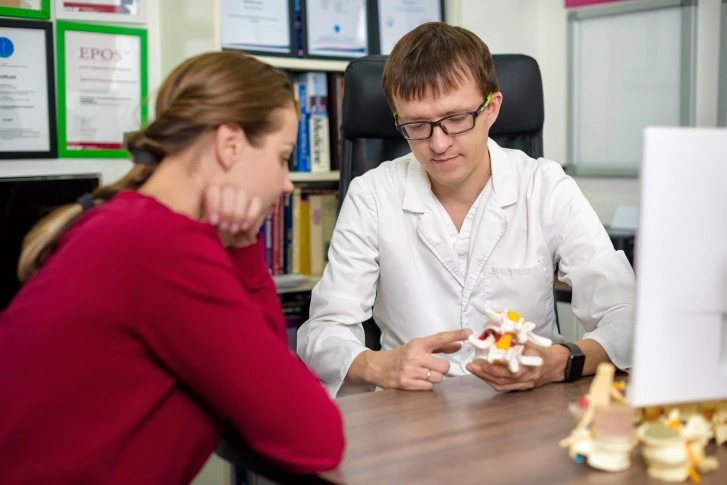
To explain it simply, resorption is when a hernia is eaten by immunity cells macrophages. Inflammation is critical for this process to be triggered. It means that drugs inhibiting inflammation may prevent resorption. This new knowledge had a profound effect on our ideas about “correct treatment” and helped us to take a fresh look at the issue.
The first papers on herniated disc resorption were published at the end of 1984-s and the beginning of 1985-s. However, the term resorption was soon forgotten and practically was not used in science. Those papers were collecting dust on the library shelves.
In 2012 Aleksander Tkachev met Alina Smirnova, a local radiologist who also showed an interest in a phenomenon of herniated disc reduction. They made MRI to patients free of charge to collect statistical data and confirm certain hypotheses.
The most important questions were: why herniated disc resorption occurred in some patients and but not in others, whether we can predict resorption using MRI-scans and whether we can influence the process of resorption by applying certain treatment options?
Dr.Tkachev demonstrated the results of his first research in 2012 in Denmark at the 12th International Forum on The Primary Care Research On Low Back Pain. Interestingly, and it was Western medicine that took an interest in the research of the doctor from Volgograd (Russia).
- In Denmark, I gave a small poster presentation (E-poster) but this conference was a turning point for me and my future specialization. Perception of new information differs significantly in Russia and other countries. New topic requires, at least, information verification but most often it is the reason to do research. Russian medical community showed apparent disregard for my ideas. A provincial neurologist with no regalia can not for sure represent academic science.
- I did not have any academic credentials and they thought that I was not able to find anything new and effective. However, Western medicine confirmed my ideas and we were the first who changed treatment options for a herniated disc. It is a paradox that new scientific achievements and better medical care are invariably followed by a greater number of patients with a herniated disc and operations. Interestingly, it does not depend on the country – we see the same situation in any small provincial Russian town and Los-Angeles, the USA.
During a conference in 2012, Aleksander said that resorption would be the main aim of conservative treatment of a herniated disk and he was right.
A herniated disc is the most serious cause of low back pain and the most common reason for surgery. Statistical data show that nearly 50.000 operations for a herniated disc annually are performed in Russia. In the USA this figure is 500.000, taking into account the population size we see that operations in the USA are performed 7 times more. This means huge health system costs that are more than 100 billion US dollars (in the USA). The number of operations has grown for the last decade by more than 150 %. Postoperative complications occur in 5-30 % of the cases.
There were many skeptics, and it is absolutely normal, but we should not give in to the forces of skepticism and move forward. Alexander gathered a team of specialists to keep on with collecting data and results of his treatment concept. Medical Institute named after Berezin Sergey (MIBS) was one of the first institutions to join the studies of a herniated disc resorption. By 2015 reports of the young specialist on resorption had gained a wider acceptance among the participants at Russian and European congresses. In 2016 an important meeting took place – Alexander met Anton Epifanov, a neurologist, manual therapist and sports medicine physician from Samara, Russia. They joined their efforts to keep on scientific research and popularize the term herniated disc resorption and introduce it to the Russian segment of the Internet.
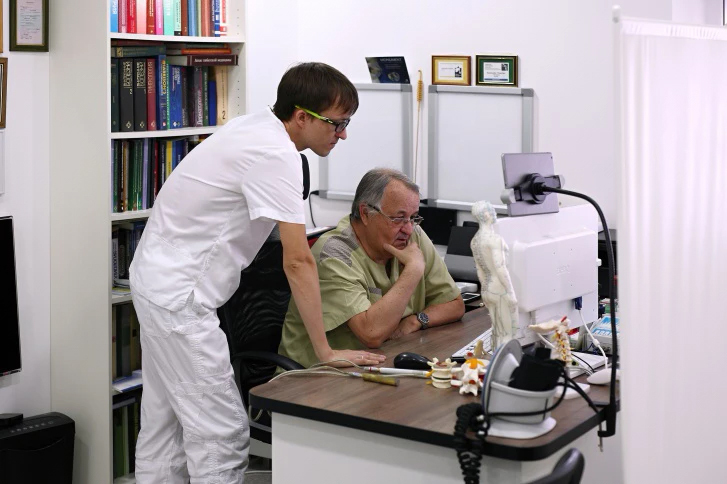
Before 2017 only 0 to 20 users searched for disc resorption in the Russian web browser Yandex. In 2017, Dr.Tkachev posted the first popular scientific video where he was speaking about everything he knew about resorption. The data when the video was posted became the point when the number of search queries began growing and now more than 1.500 people every month enter this term for online search queries. We are aware that this is not much, and we are still doing our best to popularize science, we make videos and even made a cartoon to explain patients in simple words how this method works (the link to the video is at the end of the article). We still have enough to strive for there and we keep on delivering scientific knowledge to people in simple, relatable, and sometimes funny format. Aside from that, Alexander Tkachev was involved in science, wrote articles, and conducted research.
- I believe that our devotion to science, sometimes almost fanatical, is what helps us to stay a step ahead, says Dr.Tkachev.
In 2018 achievements of the doctors were noticed by Hanne Albert, a world-known Danish scientist, PhD and professor with whom they are still actively cooperating. A prospective cohort study showed the effectiveness of non-surgical treatment of a herniated disc offered in Tkachev & Epifanov Clinic (KTE). The number of followers from different countries is growing every year and in 2019 a prominent professor Dino Samartzis from RUSH UNIVERSITY CHICAGO joined our team.
A herniated disc resorption is a natural process that we can stimulate
- Standard treatment options are based on pain relief, explains Dr.Tkachev. In this case, a doctor prescribes the drugs to reduce pain, but the hernia is still there and later it may remind itself again. It is a paradox that neurosurgeons and neurologists look differently at the same disease. The former concentrates on the hernia, the latter does not think about the hernia at all and does not take it into account when choosing the optimal treatment.
We think as neurosurgeons, but we deal with the cause of pain, spinal disc herniation in our case, using safe conservative methods to facilitate resorption.
- We revealed the mechanisms of resorption which allowed us to choose the best treatment options, says Dr.Tkachev. Yes, resorption is an autonomous process; whatever disease there is, our body has an incredible capacity to heal itself. Can gastric ulcer heal on its own? Absolutely. Can blood pressure normalize? Yes. Does it always happen? No! Does it mean that we do not need to treat such pathologies? No! The aim of medicine is to find out how gastric ulcer heals and what can be the obstacles to healing and then deal with these mechanisms, improving recovery rates. The same is with a herniated disc – we are well aware of resorption mechanisms and we use treatment to influence these mechanisms, helping to reduce hernia and heal the disc. We also choose the optimal therapy to control pain syndrome.
What science knows about resorption: resorption is scientifically proven and undeniable. On average, 63 % of patients have resorption as a result of standard treatment. Resorption occurs in 12-15 months on average.
Using our treatment algorithm resorption occurs in 3-6 months on average which is 3 times faster, explains the doctor. And 94 % of our patients have resorption compared to 63 % of patients who were given standard treatment.
For example, in 2019 there were 650 cases of resorption in Volgograd clinic and all those patients initially had indications for an operation. These results demonstrate that a herniated disc resorption is becoming a safe alternative to surgical treatment and, which is also important, more financially available.
Surprisingly, but standard treatment prevented resorption. For example, popular hormonal blockades relieved the pain for a short time but this procedure reduces the chances of resorption.
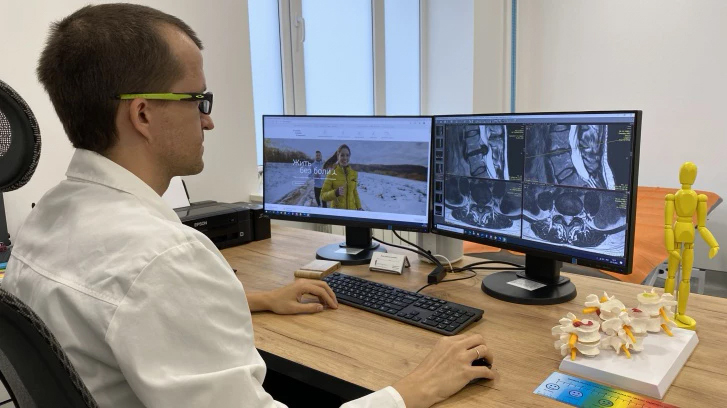
Basis of treatment
- Back pain, disc degeneration, protrusions, and herniation are the main pathologies we are dealing with, says Aleksander. In our clinics, we hold fast to the idea of medical minimalism. It means that we use strategies that proved their effectiveness and avoid prescribing unnecessary procedures and drugs.
Our treatment strategy is based on robotic laser therapy, high-intensity magnetic therapy, dry needling, pharmacopuncture, platelet-rich plasma (PRP-therapy) and we choose treatment options for each patient individually.
But our main asset is our specialists with expertise in spine conditions and disorders and pain syndromes, says Aleksander. Our neurologists can interpret MRI-scans even better than radiologists which is a rare situation.
Dr. Tkachev underlines that unfortunately, some types of herniated disc can not be reduced. In this case, the doctors offer symptomatic and preventive treatment to slow the degenerative processes and relieve pain. In case, there are absolute indications for surgery (for example, pelvic floor dysfunction, severe pain syndrome that is not relieved by pain medications, long-term conservative treatment that does not have any effect) patients are referred to a neurosurgeon.
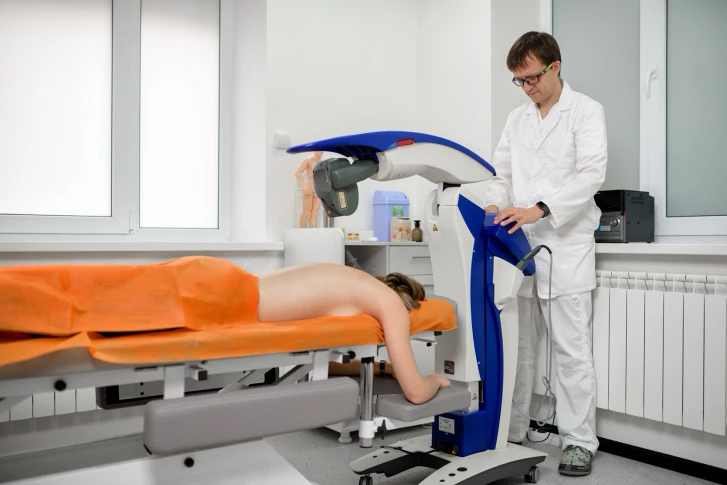
Resorption prospective
- Lately, more clinics have started to copy our treatment model. We see good copies and bad ones, says Dr.Tkachev. We are in favor of healthy and fair competition. If other clinics copy us, it means that we managed to create a good model of a clinic and treatment.
We have our clinics in four cities in Russia – Moscow, St. Petersburg, Samara and Volgograd. In summer 2021, a new clinic is opening Krasnodar, and in Kazan at the end of the year. Alexander Tkachev works in Volgograd where he treats his patients and also devotes much of his time to science.
Future plans of the neurologist from Volgograd include making resorption available for patients in all Russian cities and also going international because patients with spinal disc herniation need help no matter where they live.
